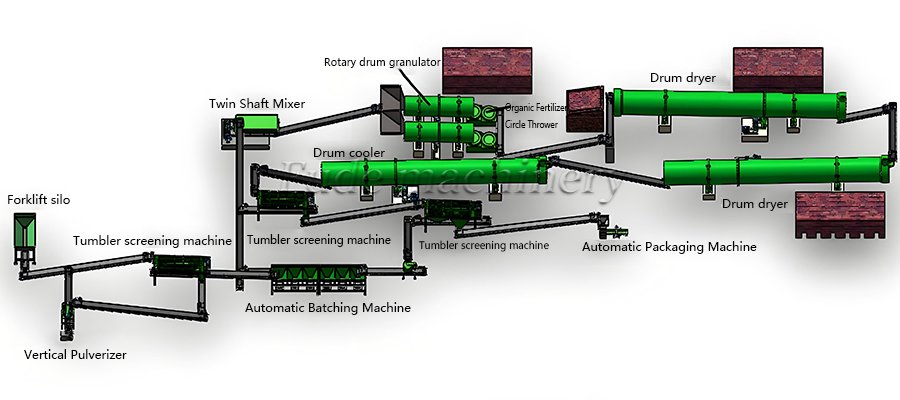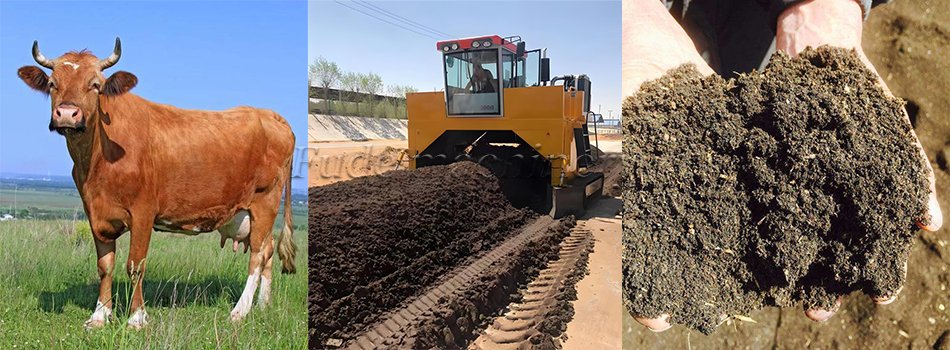Can chicken manure compost be pelletized?
321Composting and pelletizing chicken manure not only effectively solves the problem of chicken manure pollution, but also produces high-quality organic fertilizers
View detailsSearch the whole station
The process of producing cow manure as a water-soluble fertilizer is an environmentally friendly process that converts organic waste into a highly efficient agricultural resource. The process involves multiple steps, including collection, pretreatment, fermentation, extraction, concentration and packaging. A detailed description of the production process is presented below:
The first step in producing water soluble organic fertilizer is to collect fresh cow manure. Cow manure is usually collected from pastures or farms where it is more concentrated and fresh. After collection, preprocessing is necessary which involves removing impurities such as stones, plastics, etc. In addition, cow manure can be mixed with organic auxiliary materials such as straw and rice husks to improve the efficiency of the subsequent fermentation process and the quality of the product.

The pretreated mixture enters the aerobic fermentation stage. At this stage, the mixture of cow manure and auxiliary materials is placed in specially designed composting equipment for fermentation, usually a composting chute or a fermentation tank. During the fermentation process, the degradation and transformation of organic matter is promoted by the addition of specific microbial strains (such as lactic acid bacteria, yeasts, etc.).
Temperature, humidity and ventilation must be controlled during the fermentation process to ensure the activity of the fermentation flora. This process usually takes 2 to 3 weeks, during which time the organic matter is gradually broken down into simpler compounds, releasing a large amount of nutrients.
After fermentation is completed, the water-soluble nutrients in the material are extracted by water extraction technology. This step generally adopts the soaking and stirring method to dissolve the soluble components of the fermentation material in water. Subsequently, the solid matter is separated from the liquid by filtration or centrifugation to obtain a preliminary water-soluble organic liquid fertilizer.

The resulting liquid fertilizer generally contains a high water content and therefore needs to be further concentrated to increase its nutrient concentration. The concentration process can use technologies such as vacuum evaporation and membrane filtration, which can effectively remove excess water while retaining the effective nutrients in solution to obtain highly concentrated water-soluble fertilizers that meet usage requirements.
Liquid concentrates are formulated to suit the needs of different crops and soils, with specific trace elements or growth promoters added to improve fertilizer efficacy. The adjusted fertilizer must pass a series of quality tests to ensure that it meets standards for agricultural use.
pH value to prevent salinization or acid-base imbalance; storage should be sealed and protected from light, prevent leakage during transportation, and avoid application in sensitive areas such as drinking water source protection zones; operators need to wear protective equipment and set up a record of fertilizer application so as to optimize the traceability.
The process of producing water-soluble fertilizer from cow manure not only enables the utilization of waste resources, but also provides an efficient and environmentally friendly fertilizer option. Through scientific processing technology, cow dung is transformed into a nutrient-rich water-soluble fertilizer, which can effectively support agricultural production, improve soil quality and reduce negative impacts on the environment. With the advancement of technology and increasing agricultural demand, the prospects for production and application of cow manure-based water-soluble fertilizer are very broad. Learn more about cow manure as a water soluble fertilizer.Please consult us at Fude Machinery!
Composting and pelletizing chicken manure not only effectively solves the problem of chicken manure pollution, but also produces high-quality organic fertilizers
View detailsCompared to chemical fertilizers, chicken manure as an organic fertilizer improves soil structure
View detailsProcessing pomace, a high-moisture organic waste, into organic fertilizer presents significant opportunities for industries like wineries, cider mills, and juicing facilities.
View detailsMineral fertilizers demand specific raw materials to ensure optimal nutrient content and efficacy.
View details